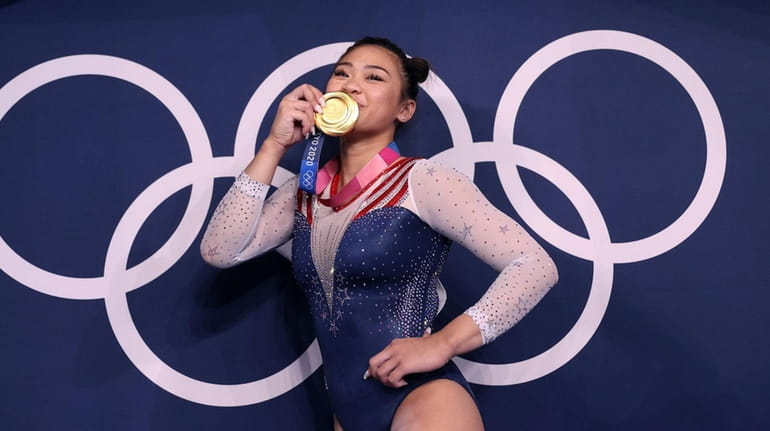Tokyo Olympics: Sunisa Lee's gold medal a win for her country, her family and the Hmong community

Sunisa Lee of Team USA poses with her gold medal after winning the women's gymnastics all-around at the Tokyo Olympic Games at Ariake Gymnastics Centre on July 29, 2021 in Tokyo, Japan. Credit: Getty Images/Laurence Griffiths
A star was born Thursday morning in Tokyo. Gymnast Sunisa Lee became not only the best story of the Olympics, but a reminder of the American dream and how it continues to inspire so many who come to this country.
Lee’s parents had never rode in a car, experienced electricity or visited a supermarket when they arrived as children in St. Paul, Minnesota. Their families, like many of Hmong descent in Laos, had fought alongside the Americans during the Vietnam War and they faced retaliation in its aftermath. Still, they believed enough in the American dream that they were willing to travel halfway around the world and start out as political refugees with nothing in order to give their children a chance at a better life.
Thursday morning, in a Minnesota catering hall with hundreds of red-white-and-blue clad members of the Hmong-American community, John Lee and Yeev Thoj watched their daughter star in the ultimate American success story, unfolding live from Tokyo on television.
Lee, the first athlete of Hmong heritage to make any U.S Olympic team, won the all-around gold medal in gymnastics at the Tokyo Olympics. With defending champion Simone Biles, who had withdrawn from the competition watching from the stands, Lee narrowly beat out Rebeca Andrade of Brazil.
The 18-year-old, who just recently graduated from high school, became the fifth straight American woman to win the all-around gold, a streak begun by Carly Patterson in 2004 and continued by Nastia Liukin in 2008, Gabby Douglas in 2012 and Biles in 2016.
"This is such a surreal moment," Lee said in a news conference after her victory. "I just feel like I could have never been here ever. It doesn’t even feel like real life."
Yes, there are definitely more than a few surreal moments to Lee’s journey to the gold-medal stand, the most recent being Biles’ announcement that she was pulling out of the competition for mental health reasons. Biles
But then, Biles bowed out and all eyes were upon Lee.
Lee is no stranger to facing immense pressure.
Sunisa Lee, who goes by Suni, grew up with five siblings in St. Paul. Money was tight and gymnastics is an expensive sport. After seeing her potential in a toddler tumbling class, her family did everything they could to support her talent. Lee practiced on a wooden balance beam that her father built for her and her family enrolled her in lessons.
Her large extended family — the Minnesota Star Tribune reported that family reunions have had more than 300 relatives — and the tight-knit Hmong community in St. Paul pitched in to help with training costs. As she progressed, they held fundraisers and cheered on Lee as her celebrity grew.
But Lee’s world turned upside down on Aug 4, 2019, two days before she was set to leave for her first national championships. John fell from a ladder while helping a friend cut down a tree branch. He broke several ribs and injured his spinal cord, initially paralyzing his body from the chest down.
She wanted to skip the nationals, but John convinced her to go, FaceTiming her from his ICU bed on the first day of the competition. She finished second to Biles in the all-around, winning the uneven bars despite having a partially healed hairline fracture in her tibula.
Lee said Thursday she considered quitting the sport during quarantine. Her father’s slow recovery, the death of two relatives from COVID and lingering problems with her foot made her question whether it was all worth it.
"This medal means a lot to me because there was a point in time where I wanted to quit," Lee said.
She didn’t. And heading into Thursday’s all-around, she knew she had to seize the moment. Lee knew how important her performance was to her country, her family and the Hmong community.
And so in her last rotation of the night, she nailed the floor exercise, which had been changed that morning by her coach, Jess Graba, in order to eliminate some of the poor landings she had previously because of a weak left ankle.
"I did it!" she screamed in a FaceTime call to her parents, family and friends watching back in Minnesota.
There wasn’t a dry eye in the room.


